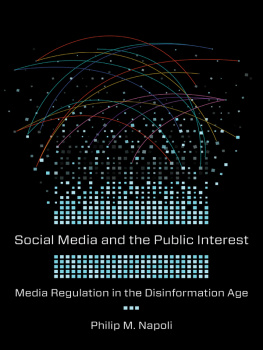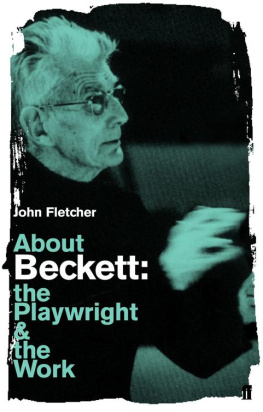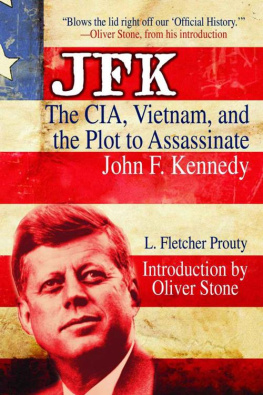Table of Contents
Social Media and the Public Interest
Social Media and the Public Interest
Media Regulation in the Disinformation Age
Philip M. Napoli
Columbia University Press
New York
Columbia University Press
Publishers Since 1893
New York Chichester, West Sussex
cup.columbia.edu
Copyright 2019 Columbia University Press
All rights reserved
E-ISBN 978-0-231-54554-9
Library of Congress Cataloging-in-Publication Data
Names: Napoli, Philip M., author.
Title: Social media and the public interest: media regulation in the disinformation age / Philip M. Napoli.
Description: New York: Columbia University Press, 2019. | Includes bibliographical references and index.
Identifiers: LCCN 2019021836 (print) | LCCN 2019008051 (e-book) | ISBN 9780231184540 (cloth: alk. paper) | ISBN 9780231545549 (e-book)
Subjects: LCSH: Social media and journalism. | Web usage mining in journalism. | Social media.
Classification: LCC PN4766 .N36 2019 (e-book) | LCC PN4766 (print) | DDC 302.23dc23
LC record available at https://lccn.loc.gov/2019021836
A Columbia University Press E-book.
CUP would be pleased to hear about your reading experience with this e-book at .
Cover design: Lisa Hamm
For Donovan
Contents
M y previous books have been relatively solitary endeavors. This time, though, I find myself with quite a laundry list of individuals and organizations to thank. All of them have helped to make this a better book than it otherwise would have been.
First and foremost, I need to thank Philip Leventhal of Columbia University Press, for convincing me to revive a project that I had let go dormant. Without his encouragement and gentle prodding, I might have let this project continue to sit among my other half-baked book ideas. His editorial feedback along the way has been incredibly helpful. The topic ended up being even more of a moving target than I imagined when I started the project (which was before the 2016 election), so I am also appreciative of his patience as I reworked chapters and adjusted small details right up until the very end. This is a book that just never felt done. I also appreciated the feedback of the two anonymous reviewers who generously read and commented upon both the original proposal and the completed manuscript. Thanks also to Peggy Tropp for a really superb job of copyediting, and to Ben Kolstad, for overseeing the production.
Also vitally important has been the support I received in the form of an Andrew Carnegie Fellowship from the Carnegie Corporation of New York. While this publication was made possible by a grant from the Carnegie Corporation of New York, the statements made and views expressed are, of course, solely my responsibility.
I have been able to road test some of the ideas presented in this book at a number of different conferences, where I received a tremendous amount of valuable feedback (along with a fair bit of pushback). Thank you to the organizers of all of these events for including me. Portions of this book were presented at the 2017 Data & Society Workshop on Propaganda and Media Manipulation in New York (thank you, danah boyd, for the invitation and feedback); the 2016, 2017, and 2018 Telecommunications Policy Research Conferences (TPRC) in Arlington, Virgina; the 2018 meeting of the American Political Science Association in Boston; the 2018 European Media Management Association Conference in Warsaw; the 2018 Algorithms, Automation, and Journalism Conference in Munich; the 2018 Defending Democracy Conference at Princeton University; the 2018 Collective Behavior, Social Media, and Systemic Risk Conference, also at Princeton; and the 2017 Nordic Political Science Congress in Copenhagen. I am particularly grateful for the detailed comments and suggestions I received from Mark Nadel of the Federal Communications Commission at TPRC and Kari Karppinen of the University of Helsinki at the Nordic Political Science Congress.
I was also fortunate to be able to present ideas from this book in more informal settings. Thanks to Sharon Strover and her colleagues at the University of Texas for inviting me speak there, and for the useful feedback that they provided. Thanks also to Fritz Mayer at the Sanford School at Duke for inviting me to speak in his Democracy Lab, and to the Duke Political Union and the Durham League of Women Voters for giving me the opportunity to present ideas from this book to their members as well. Thank you to Sanford Dean, Judith Kelly, for giving me the opportunity to present a couple of the chapters from this book as part of Sanfords weekly faculty seminar series, as well as to the Sanford Schools Board of Visitors. Thanks also to Amit Schejter for agreeing to a last-minute request to read the entire manuscript.
My colleagues and students at Duke Universitys Sanford School of Public Policy have provided an incredibly fertile environment for working on this book. Particular thanks are due to the students in my undergraduate seminar on Algorithms, Journalism, and the Public Interest. I used the syllabus for the 2017 version of the course to essentially lay out the outline for the book, and the students in the 2018 version were subject to a (very) rough draft as part of their assigned reading. The discussions in these classes often had me taking more notes than the students. Thank you also to hall mate Bill Adair, director of Sanfords DeWitt Wallace Center for Media & Democracy, for serving as a sounding board for various ideas over the past couple of years and for keeping me abreast of developments in the relationship between social media and fact-checking. I also benefited tremendously while working on this book from the administrative support provided by Shelley Stonecipher and Kim Krzywy of the DeWitt Wallace Center.
I also benefited from incredibly helpful research assistance from some of my Duke University undergraduate students, including Petra Ronald (now at Microsoft), Peter Andringa, and Jake Schulman. I am eternally grateful for their help with the drudgery of tracking down articles and formatting the references.
Portions of the introduction to this book appeared in volume 22, issue 5, of the journal First Monday as Why Media Companies Insist Theyre Not Media Companies, Why Theyre Wrong, and Why It Matters (2017) and in volume 44, issue 4, of Intermedia as Platform or Publisher? (also 2017). Both of these articles were coauthored with my doctoral student Robyn Caplan, who has been working on her dissertation on algorithmic accountability and content moderation while I have been working on this book. Our conversations and collaborations over the past couple of years have been incredibly valuable to this book. Portions of appeared in volume 70, issue 1, of the Federal Communications Law Journal as What If More Speech Is No Longer the Solution? First Amendment Theory Meets Fake News and the Filter Bubble (2018). Thank you to these publications for allowing the material from those articles to be used here.
A huge thanks, as always, to my wife Anne, for listening as I bounced random ideas and dozens of title permutations off her, and as I fretted that the whole project was going off the rails. I dont know what Id do without her patience, tolerance, insight, and support. Thanks also to my parents, who encouraged my love of writing, reading, and learning every step of the way. And then theres my son Donovan, who really knows how to help me keep things in perspective. When I asked him recently what he wants to be when he grows up (hes nine), his smart-ass response was something more interesting than what you do. This book is dedicated to him.















